When you’re a beginner, camping can seem intimidating. Fortunately, there are many things that beginners can do to make their first trips more enjoyable and stress-free. In this article we’ll discuss helpful tips for beginners and things to know before going out into the wilderness for the first time. We’ll also cover tips for each phase of camping: planning, packing, cooking, setting up camp and enjoying your experience that new campers and seasoned adventurers alike can benefit from!
This camping guide for beginners was created for anyone who has never gone camping before, and for anyone who wants to have a more enjoyable experience during their next camping trip.
The first thing you should do before your next camping trip is research. You’ll need to see what camping spots are within the distance you’re willing to travel. You’ll also want to research what the weather is going to be like while you’re there—the closer your camping date is, the more accurate the weather forecast will be, so be sure to keep an eye on forecast updates in the days leading up to your trip so you can plan and prepare accordingly.
Contents
1) Choosing Your Ideal Camping Spot
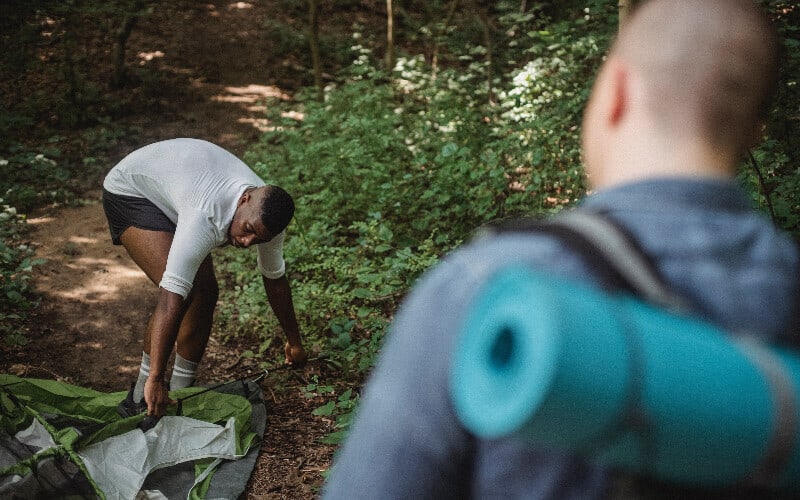
The key to a great camping trip is picking the right location and activities to enjoy. In fact, picking which campsite to spend your next night at can make or break your camping experience. When deciding between campsites, you should consider the place itself, the nature and landscape of the place, and of course, how you’re going to get there. When choosing a campsite there are a number of questions to ask yourself:
1. Do you want to stay close to nature and seclude yourself deep in the woods or do you want to stay closer to civilization and have the option of showers and bathrooms nearby? If you want to avoid crowds and noise, camping on private property is the way to go—but you may miss out on some amenities such as community showers and other luxuries.
2. How far are you willing to walk to get to the campsite? Some campsites allow you to park right at your campsite. Others require you to park on the outskirts of the land and hike to your spot. Knowing how far you have to (and are willing to) walk to get to your spot can influence the amount and type of gear you bring.
3. Do you want to go fishing, kayaking, or swimming while you’re there, or are you just planning on relaxing at camp? If you want to enjoy a scenic river, lake or ocean, look to public lands with access points near your campsite to get in the perfect day of fishing, swimming, and hiking.
Glamping
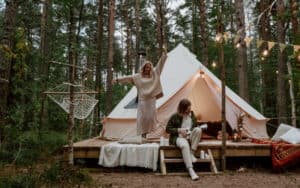
When most people hear the word “camping,” they probably think of a rickety old tent on a dirt road. But, have you ever tried glamping? Glamping is a blend of camping and glamour, so you get all the fun of the great outdoors, plus all the luxuries of a five-star hotel. It’s a way to enjoy all the fun of camping, but with creature comforts that make roughing it easier to take. Of course, it’s really fun to rough it, but sometimes it’s nice to have a little more comfort. If you’re interested in glamping, check out our article here, where we discuss the gear you can bring to make your camping trip feel more like a luxurious vacation.
2) Packing for Your Camping Trip
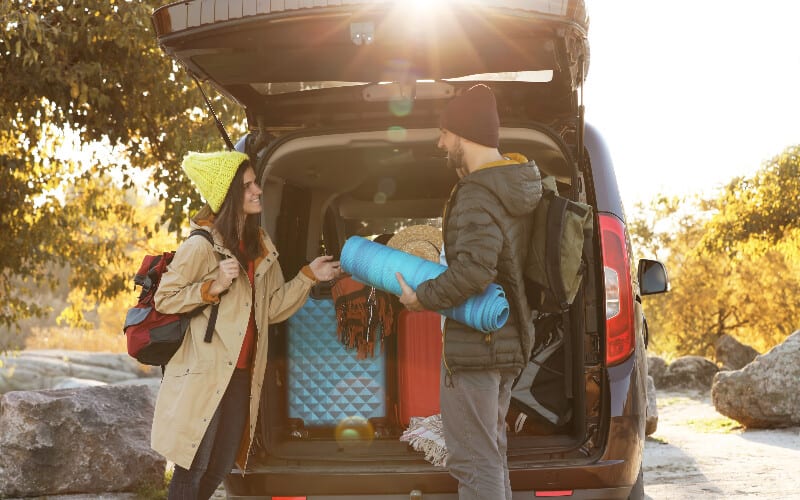
When packing, it’s important to pack only what you need so that you don’t have to carry more than necessary with you during your trip—but also be sure you aren’t missing important gear!
Camping Gear Essentials
There are a number of items that are essential for any camping trip. From gear to sleep in, to gear to cook with, water storage, and more, you’ll want to make sure you have the necessities covered before you head out.
Camping Sleeping Gear
Essential camping trip gear includes: a tent, an air mattress or cot, a sleeping bag and some extra blankets. If you know the weather is going to be nice, you might choose to opt for a hammock instead… just be sure to bring a mosquito net to help keep insects off you while you sleep! If hammock camping interests you, give our Ultimate Guide to Hammock Camping a read.
If you need a tent and don’t already have one, check out our handy Camping Tent Buying Guide.
Camping Lighting
Be sure to bring a headlamp and/or flashlight (ideally both—a backup never hurts). Headlamps can be especially useful if you need both hands free, such as if you’re collecting firewood while camping overnight.
You’d also benefit from having lighting placed strategically around your campsite (fires are great, but they don’t illuminate far), and having some tent lights can keep you from fumbling around in the dark in your tent once the sun has gone down. Here’s a breakdown of the best lighting gear for your next trip: Camping Tent Lights & Campsite Lighting Ideas.
Camping Safety
Every camper should also pack a first aid kit because you never know what can happen. Having Band-Aids, gauze, and sterilizing solutions on hand can help prevent potential emergencies. It’s also a good idea to bring along plenty of insect repellent and sunscreen. Mosquitos and ticks can carry disease, and prolonged exposure to the sun without proper protection can damage your skin (and make you miserable for the remainder of your trip!). Check out our guide on How to Repel Mosquitos and Insects While Camping.
Camping Clothing
Make sure to pack clothing that is appropriate for the climate in your area during the, as well as gear that will protect against weather conditions.
For example, if you’re going to be camping in warm weather, consider packing a t-shirt, shorts, and sandals. If you’re going to be camping in cold weather, consider packing a sweatshirt, gloves, and boots. It’s also important to remember that your campsite may not have running water or bathrooms on site. You’ll need to pack toiletries like toothpaste and deodorant so that you can take care of yourself while you’re away from home!
Camping Backpacks
The gear listed above needs to be transported in something, and there are some great backpacks that are designed to maximize space, efficiency and organization. Sure, you could just use any old backpack, but the lack of compartments in backpacks not designed for the outdoors can cause headaches when you’re digging around for small pieces of equipment that wind up buried at the bottom of your pack.
Additionally, many outdoor backpacks have extra straps to help with support by evenly distributing the weight across your back (along with other handy features such as easy-to-access water bottle holsters and small compartments for flashlights, first aid kits, etc.). Check out our guide to find The Best Hiking & Camping Backpacks to compare prices and pros and cons so you can be sure you have the perfect pack for your trip.
What to Pack for Camping in Rainy Weather
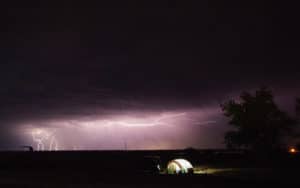
If you know there’s a chance of rain during your camping trip, it’s a good idea to pack a raincoat and other gear that will help you stay dry. Some examples of things to pack are a tent with a waterproof floor, an outdoor shower, and an umbrella. Remember that the longer your trip is, the more gear you’ll need for camping in rainy weather! We’ve put together some handy hacks for camping in the rain, be sure to check them out if there’s a chance of a storm during your outing!
Thunderstorms can add an element of danger to any outdoor trip, so be sure you’re prepared and know what to in case a thunderstorm occurs while you’re camping. We’ve put together a handy guide: Tips to Stay Safe While Camping During a Thunderstorm.
Tips for Camping Near Wildlife
It’s important to remember that not all wildlife encounters are friendly. Most animals would prefer to stay away from humans, but many can wander into your camp (especially while you’re away) if they smell food… and many of them would gladly chew through your tent to grab a delicious treat if given the opportunity. If you’re camping near bears or any other large animals like wolves or mountain lions, it’s best to carry bear spray and tie food up in trees.
For more tips on best practices, scents, and technology to use to keep animals at bay, see our article about How to Keep Animals Away from Your Campsite.
Inspecting & Testing Your Equipment
The last thing you want is to arrive at your campsite only to realize some of your gear is damaged, faulty, or missing. There are few worse feelings than arriving to your campsite only to find that you’re missing a crucial pole for your tent, or to discover that you’re out of propane for your camping stove. In order to avoid any nasty surprises, be sure to inspect your camping gear well in advance of your trip—that way, if you find anything missing or damaged, you have plenty of time to replace your items without scrambling at the last minute.
2) Cooking on Your Camping Trip
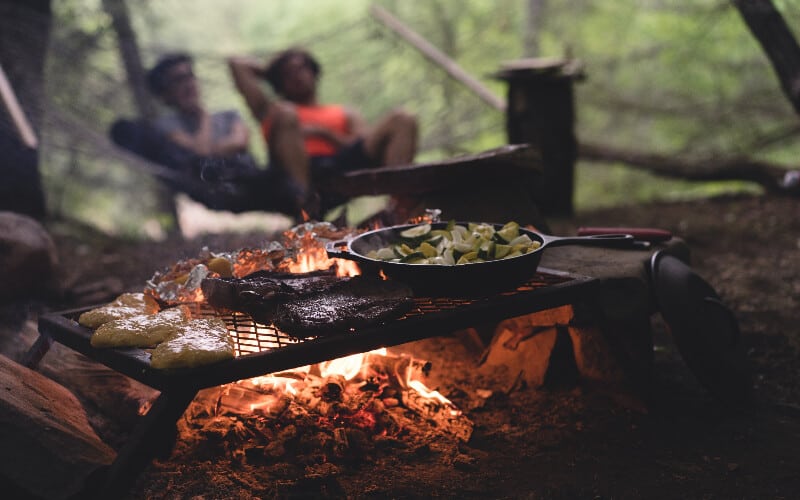
For many, cooking during a camping trip can be one of the most exciting and rewarding parts of the trip. It’s important that you pack camping cooking equipment such as pots, pans, spatulas, tongs and whisks to make cooking easy.
Some campgrounds have grills at the campsites that you can utilize to cook your food. Be sure to research and see if that will be an option before you set out on your trip. Otherwise, if you don’t plan on hiking too far you might want to bring a small portable grill that you can set up at your campsite.
However, a full grill isn’t always necessary. Many campers prefer camping stoves because they’re more compact, and others simply choose to cook right over their campfire. Cooking over a campfire is fairly convenient and fun, and can even be a romantic experience for you and your camping partner if you’re out on a getaway.
Some campers enjoy cooking with the Dutch oven over their campfire. This is another great option if you want to cook an entire meal over a fire or grill without using much fuel. If that’s not what you’re looking for, we recommend bringing some cast iron skillets to use on your campsite grills—they’ll heat up nicely and cook quickly while delivering excellent food quality!
Best Foods to Cook While Camping
All the cooking equipment you packed won’t do you much good if you don’t pack any food to cook. Some of the most popular food choices to cook while camping include soups, chilis, and beans (best cooked in a Dutch oven), grilled foods such as hamburgers, hotdogs and bratwursts, and barbecue such as steaks, ribs, porkchops, and chicken. For vegetarians who want to enjoy grilling, everything from vegetable kebabs to grilled stuffed mushroom caps can be tossed on the grill for a delicious and filling meal.
Whatever meals you settle on, be sure you have the right equipment to cook and eat them (if you’re cooking hamburgers, make sure to have a spatula, if you’re making beans be sure to have a ladle and bowls, etc.). Then just get all your ingredients together and throw the perishables in your cooler with some ice before you head out and you’ll be ready to enjoy after you’ve set up camp.
Also, be sure your food is secured in animal-proof containers (especially if you won’t be camping near your vehicle). The type of storage that’s best for your needs can vary by what wildlife is in the area you’re going to be camping. If you know there might be bears or pumas in your area, you should consider investing in bear-proof containers and coolers.
Dutch Oven Cooking
Dutch ovens are an essential part of your outdoor kitchen setup because they can be used for so many different purposes. They cook great meals like soups or chili quickly over campfires and stoves. They can even be used to bake bread (who doesn’t love some cornbread with their chili?!).
Ensuring You Have Clean Water
Clean water for washing, drinking and cooking is one of the most important things you’ll need when you’re camping in the wilderness. The last thing you want is to find yourself without water while you’re out camping, especially if you’re out in the middle of the wilderness. You have several options for when it comes to ensuring you have enough potable water during your camping trip, so it’s simply a matter of choosing which options are best for your needs. Below we look at gear to purify and store clean water, but for a more in-depth look, give our How to Purify Your Water guide a read.
Water Bottles & Water Storage
Bringing packs of water bottles and jugs full of clean water is a popular choice among campers. You don’t really need any special equipment or gear, just stop by the store on your way to the campsite and grab some packs of bottles and some jugs and you’ll be ready to go. The downside is you’ll need extra space in your vehicle, and you’ll wind up generating extra trash that you’ll need to take care of and dispose of at the end of your trip.
If you prefer more durable water container options that are designed for rugged outdoor use, check out our reviews of The Best Camping Water Containers.
Survival Straws
Alternatively, you may wish to pack a survival straw. Survival straws are handy, affordable devices that let you drink directly from a river, stream, lake, or other body of water. No need to worry about drinking from a body of that might contain harmful bacteria or pollutants. These straws have been designed for outdoor use and easy storage in a backpack, pocket, or bug-out-bag. It’s compact, lightweight, and a no-brainer addition to your camping gear collection or survival kit.
Bottle Filters & Water Purifiers
Bottle filters and purifiers are compact and easy to use, and they don’t require electricity to run. Plus, they don’t add chemicals to your water like chlorine tablets do. The best part is, once you’ve filtered or purified your water, you can carry it in a water bottle with you wherever you go. Fill up your pure water reserves at your home base, and you’ll have enough water to take anywhere.
3) Arriving at Camp & Getting Set Up
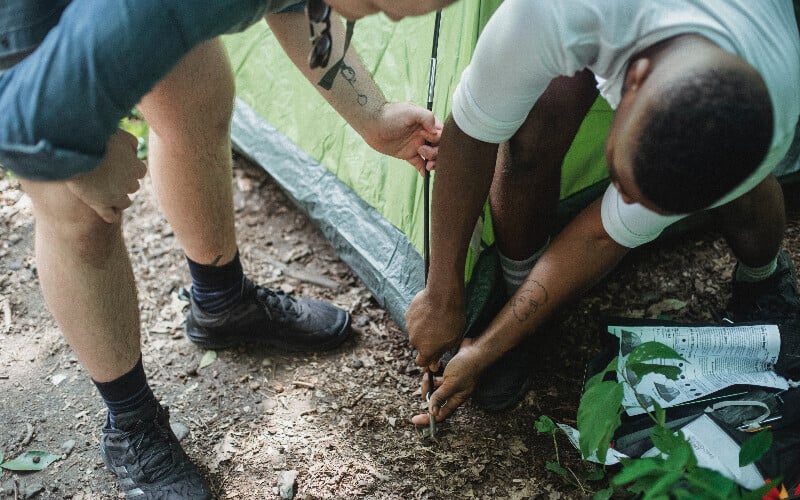
There’s something exhilarating about arriving at your campsite and stepping out of your car into the great outdoors. The road is behind you and the trails are before you. No matter what you plan to do, this is the moment when your adventure begins. As you step out of the car be sure to take in your surroundings and make some mental notes of what you see.
Ideally, you should arrive to your campsite with plenty of daylight remaining. If you arrive near or after dark, get your headlamp (or flashlight) out and explore your surroundings to make sure you’re not setting up in a dangerous location. Is there a place where you want the tents to go? Is there a good place to put the fire pit?
Take a minute to scope out the area and decide where you’ll set up your tent or lean-to. Make sure there will be enough room for you to sleep and have your belongings, and avoid setting up in areas that could flood or are particularly buggy.
Setting Up Your Tent
Once you’ve decided where your fire and tent will go, it’s time to get to work setting up camp. It’s best to set up your tent first (unless you’re in cold weather—then getting a fire going might be more of a priority) so you don’t have to worry about it later, and you can get your gear tucked away from the elements while you work on setting up the rest of your campsite.
Taking Care of Your Food & Drinks
Next, make sure all of your food and drinks are stored safely—ensure they’re stored at the proper temperature in a cooler (for food and drinks that need to stay cool), and be certain they’re protected from local wildlife. Ideally, you should keep your food and drinks in your vehicle if it’s nearby. If you’re away from your vehicle, consider investing in animal-proof containers to protect your food.
Preparing Your Campfire
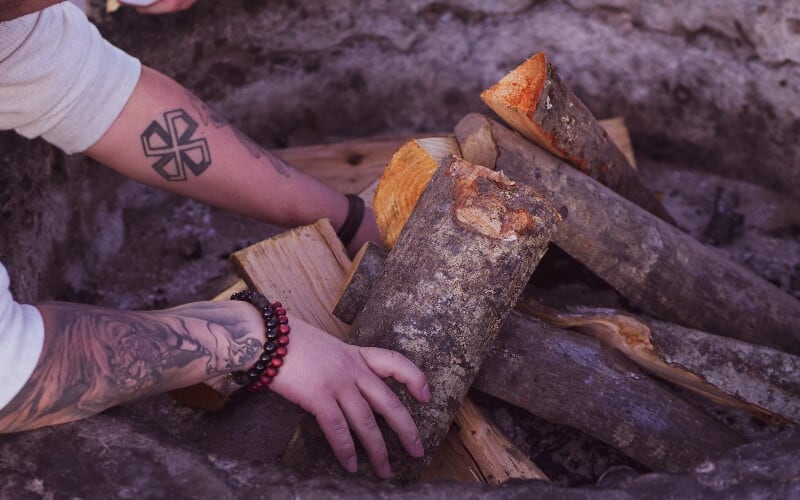
Then, you should get to work on collecting wood for your campfire. Depending on how much daylight you have left, you may want to collect enough wood to last for the entirety of your stay so you don’t need to worry about it later. Or, if it’s getting dark (or if you just want to get to relaxing, cooking, or other activities) you should grab enough wood to get you through the evening—and you can worry about getting more fuel as needed.
If you’re planning on hanging around your campsite for the rest of the day or evening, you might want to go ahead and get your fire going. Building a campfire can be a bit of a challenge, especially in the woods where you don’t have a prebuilt firepit. There are, however, some steps you can take to make building a campfire much easier, which we’ve outlined in our blog post: How to Build the Perfect Campfire Every Time.
If you’re planning on exploring or enjoying some outdoor activities, you should wait to build your fire until you’re back for the day (not only is leaving a fire unattended potentially dangerous, it is also illegal in many areas).
4) Relaxing & Enjoying Your Trip
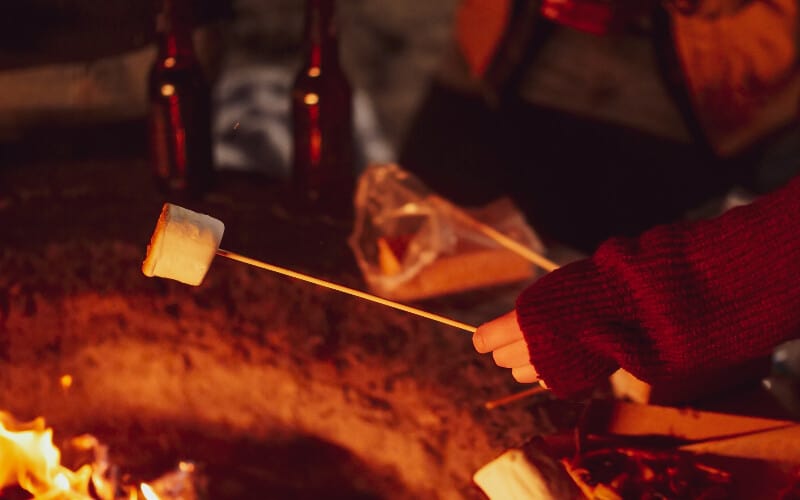
Now for the most fun part of the beginner’s guide to camping: once you’ve gotten your camp set up, it’s time to enjoy your outdoor adventure. Whether you’re planning on hanging out around the campfire or exploring the hiking trails, lake, or river, you’re in for a great time. Keep plenty of clean water on hand at all times to prevent dehydration.
Also, be sure to keep insect repellant and sunscreen with you as needed, and reapply frequently—sunburns and bug bites can dampen your experience.
If you’re going to be leaving your campsite unattended, do some quick cleanup before heading out on your adventure. Pick up any trash you may have left lying around so that wildlife can’t get ahold of it, and store any food that may be out in your animal-proof containers or your vehicle.
As mentioned before, it’s important you fully extinguish your fire before venturing away from camp—not only can you get a ticket for it if a park ranger or game warden happens to wander by, but you also risk starting a fire that could cause a lot of damage and harm a wildlife.
5) Packing Up & Returning Home
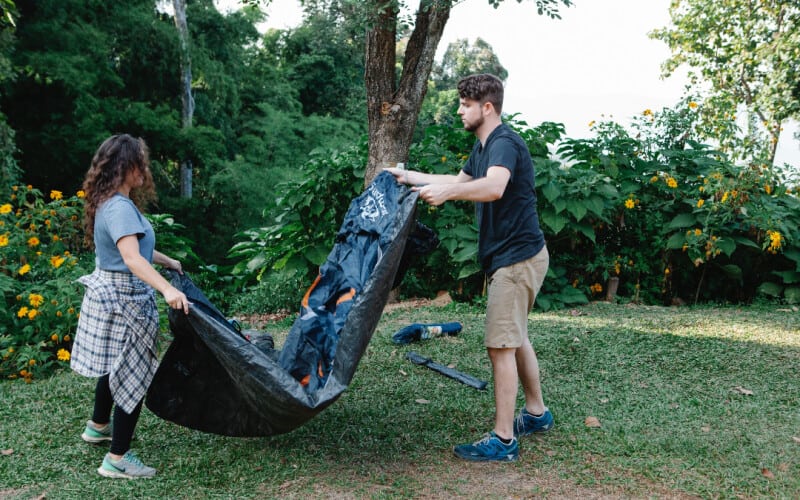
All good things must come to an end, and camping trips are no exception. When it’s time to wrap up your outdoor adventure, follow the tips below.
Cleaning Up Your Campsite
First, be sure to do a thorough job of collecting your equipment and trash to ensure you leave no trace. If you’ve been cleaning up after yourself throughout your trip, your trash should already be collected and ready to load up.
Be certain your fire is completely extinguished before you leave camp. Use water, sand and/or dirt to completely smother the fire and its coals to help make sure it won’t reignite later.
Taking Care of Your Equipment
When you get back home, it’s a good idea to take some time to clean up your camping gear before stowing it away. It may be tempting to skip the after-care process, but you can extend the life of your gear if you’ll take an hour or two for some simple, but important, maintenance. As you clean and maintain your gear, be sure to keep an eye out for any damage. If you notice tears, rust, or damage, make a note to either fix the damage (if possible) or replace the damaged gear before your next trip. In this camping guide for beginners we’ll look at some basic tips to maintain your gear, but be sure to check out our in-depth care guides for more tips and techniques.
Taking Care of Your Tent
Tents can be one of your most expensive pieces of camping equipment, so it’s worth taking some time to clean it and let it air out to help prolong its life (and, it won’t have an old mildew smell during your next outings—definitely a bonus!). Different tents have different care processes, so be sure to consult your tent’s user manual for more information. Also, be sure to check out our guide about how to take care of your tent here.
Taking Care of Your Sleeping Bag
After a few days in the wilderness, it’s a good idea to wash your sleeping bag as well. Not only can you get rid of odors that might have built up in your bag over your trip, but you can make sure your gear wasn’t damaged. Proper care will vary based on your sleeping bag, so consult your owner’s manual.
Taking Care of Your Cooking Gear
Take a few minutes to wash your cooking equipment and let it all dry before storing it. If you used a Dutch oven or a cast iron skillet on your trip, take care of it and properly season it before putting it away. While this camping guide for beginners doesn’t cover proper cleaning of your cooking gear, we’ve put together a separate comprehensive article with tips to help extend the life of your equipment.
Taking Care of Your Clothes
There’s a good chance your clothes will have a smoky scent from your campfire (and they’ll probably be dirty, regardless), so it’s a good idea to wash them before storing them (especially any jackets or outdoor gear you save specifically for outings).
Once everything has been cleaned and stored away, you’ll be ready to start planning your next outdoor adventure!
Camping Guide for Beginners Wrap-Up
If you follow the tips outlined above you’ll have an amazing time on your next trip!

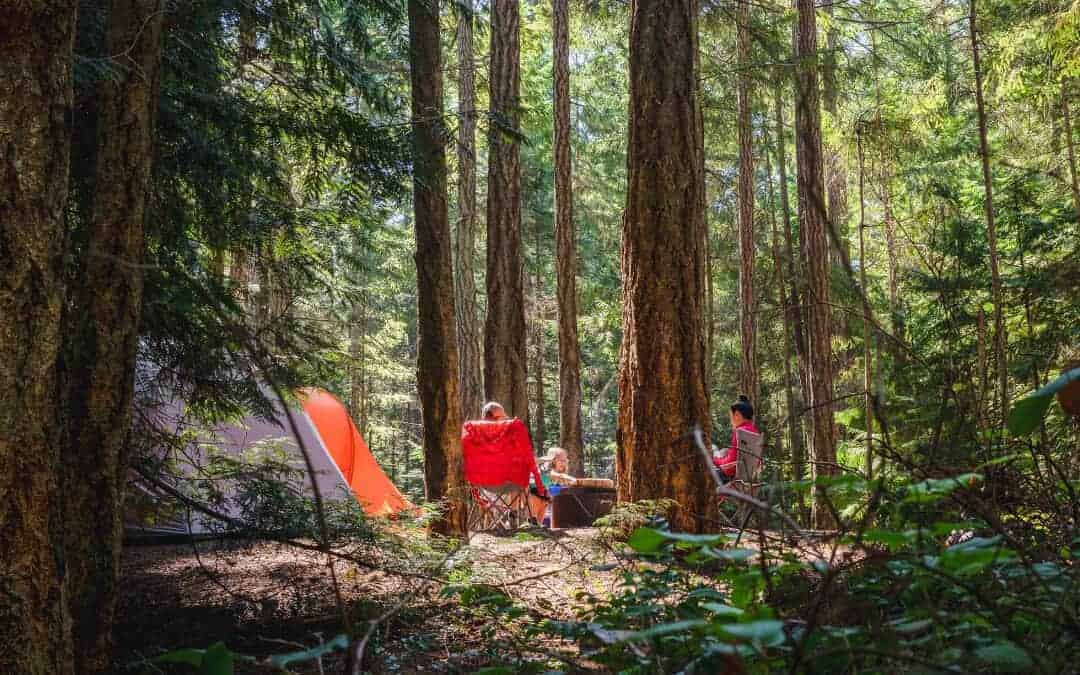
0 Comments